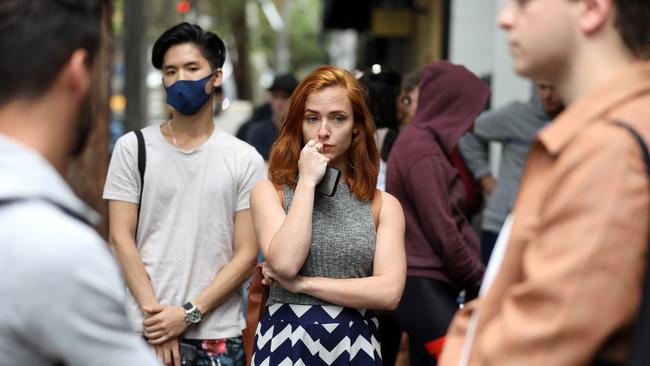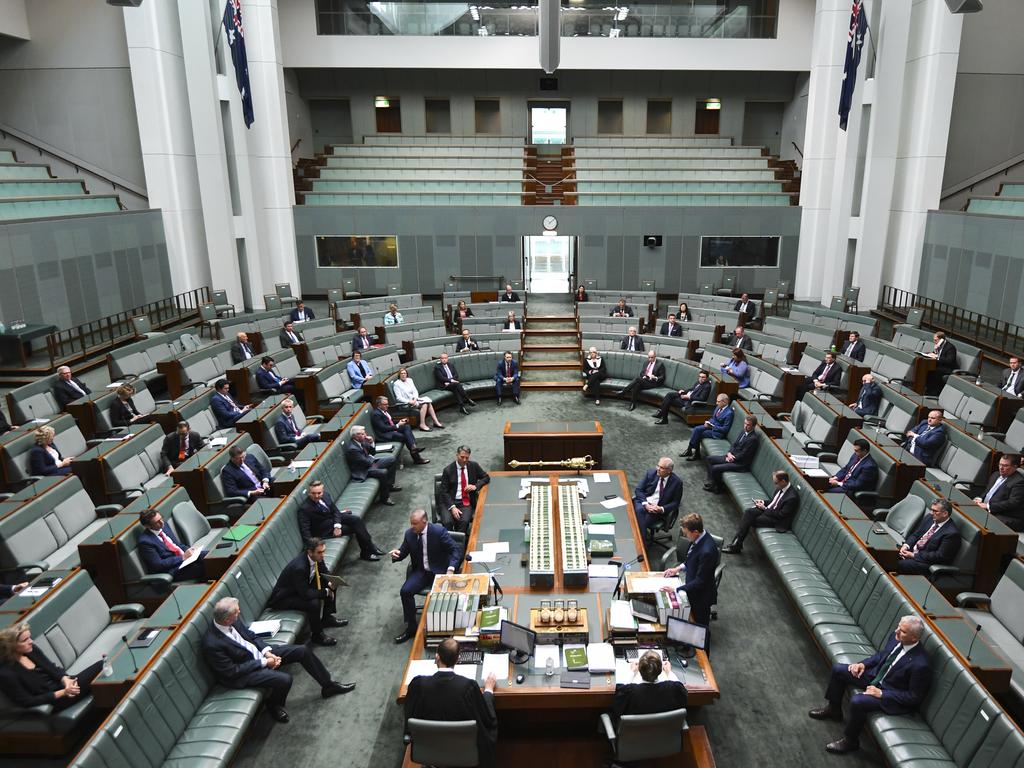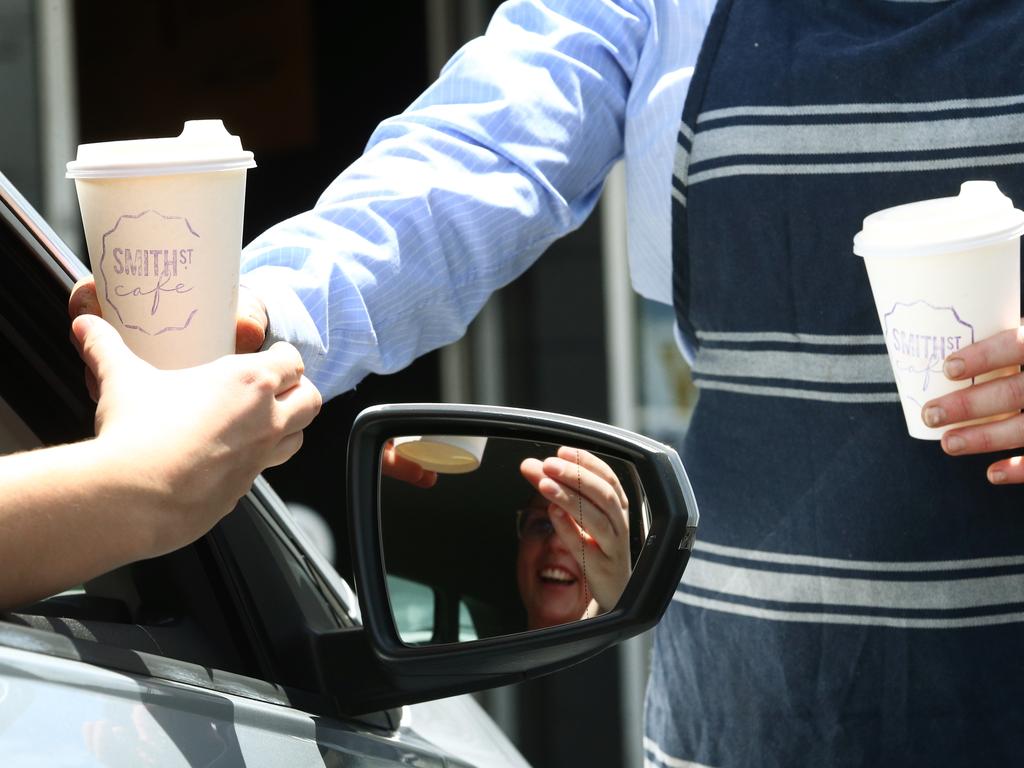Coronavirus: Echoes of Great Depression as million more to go on benefits
More than a million Australians could be forced on to welfare in a crisis the PM warned had not been experienced since the Great Depression.

More than a million Australians could be forced on to welfare by lockdowns to combat the coronavirus, which Scott Morrison warned had plunged the country into an economic crisis not experienced since the Great Depression.
Thousands of people queued at Centrelink offices around the country on Monday as the shutdown of much of the hospitality sector put more than 300,000 jobs in jeopardy.
The fallout from the coronavirus pandemic deepened with the NRL suspending its 2020 season, Olympic organisers preparing to postpone the Tokyo Games and Queensland becoming the latest state to lock down its borders.
Global shares and commodities plunged, with Australia’s S&P/ASX 200 share index diving 8.6 per cent to 4402.5 points — its lowest point since November 2012 — before closing down 270.6 points or 5.6 per cent at 4546.
US index futures traded down by a daily limit of 5 per cent, pointing to another ugly night ahead for global markets.
Ahead of the passage of nearly $84bn in stimulus measures late on Monday night by a skeleton parliament and with MPs not due to sit again until August 11 to comply with strict social distancing rules, the Prime Minister conceded “many thousands of Australians” would lose their jobs.
“They are lining up at Centrelink offices as we speak — something unimaginable at this scale, only weeks ago,” Mr Morrison said.
“With the rest of the world, we face this unprecedented challenge. A once-in-a-100 year event. A global health pandemic that has fast become an economic crisis, the like of which we have not seen since the Great Depression.
“Life is changing in Australia, for every Australian. And life is going to continue to change. For many, young and old, 2020 will be the toughest year of our lives.”
The queues outside Centrelink offices came after the MyGov website crashed from a record surge in those seeking urgent income payments.
Ninety-five thousand Australians tried to access the site at the same time — nearly double the number for which the government had prepared.
Josh Frydenberg said Treasury was expecting an additional million people — including sole traders, casuals and workers — could be forced on to welfare support with pubs, clubs, bars, gyms, theme parks, churches and cinemas all shutting their doors.
The Treasurer said costings of the government’s jobseeker coronavirus supplement took into account the possibility of up to a million people receiving financial support on top of those already receiving Newstart Allowance.
“This does not mean the new recipients are all unemployed, as they could be sole traders, casuals or other workers who have seen their hours worked and income earned fall below the income test of $1086 a fortnight,” he said.
The Morrison government pushed a suite of legislation through parliament, including nearly $84bn in fiscal measures, to fast-track payments for workers, welfare recipients and businesses.
The stimulus was expanded when the government moved an amendment in the Senate to increase a $550 fortnightly payment to about 230,000 students.
The measure will cost the budget about $1.6bn. In addition, a $40bn discretionary fund has been set aside under the control of the Finance Minister, Mathias Cormann.
Wage subsidies of up to $100,000 for businesses will be available from April 28, special access to superannuation will be unlocked to help people endure the lockdown and two $750 welfare payments will be processed from March 31 and July 13.
With border control measures imposed by Western Australia, Queensland, South Australia, Tasmania and the Northern Territory, economists are warning that the unemployment rate could rise above 8 per cent by the end of 2020.
Mr Morrison is expected to unveil additional support packages for at-risk industries and workers.
On Monday, the number of COVID-19 cases in Australia surged past 1700, with 37 per cent reported in the past 48 hours.
The COVID-19 economic shock and strict new emergency measures sparked a flurry of mass sackings and redundancies on Monday with ALH — the biggest pubs, pokies and hotels business in the country — standing down as many as 8000 staff from its 15,000 workforce.
Helloworld Travel stood down 1300 staff and made another 275 employees redundant.
Flight Centre fell into a trading halt ahead of cutting the salaries of its senior leadership team in half and suspending the payment of its 40c-a-share interim dividend, due in April, in a bid to preserve cash.
Crown Resorts also announced it was closing its gaming floors and food, beverage and conference facilities in response to the shutdown of casinos.
Federal Group, Tasmania’s largest private employer which operates two casinos, hotels and pubs, stood down 1500 workers.
Other major hospitality and gaming companies were expected to announce job losses this week.
Mr Morrison, who held a virtual annual leaders’ meeting with Singapore Prime Minister Lee Hsien Loong on Monday and will take part in a G20 leaders’ telephone hook-up this week, said the government would do everything it could to shield businesses.
The national security committee of cabinet will meet on Tuesday ahead of a national cabinet meeting with state and territory leaders.
After updating estimates of the total and permanent income loss for the Asia-Pacific region, ratings agency S&P has forecast real GDP growth of 0.4 per cent in Australia this year, with the unemployment rate rising to 6.1 per cent.
S&P predicts a rebound next year, with the unemployment rate flattening to 5.7 per cent and GDP ticking up 4.4 per cent in 2021.
The Australian Chamber of Commerce and Industry, which represents both small and medium-sized businesses, said it had been inundated with calls from companies asking if they were deemed essential services.
ACCI chief executive James Pearson said the government should use the current Australian and New Zealand Standard Industrial Classification to register when businesses should be closed.
“We suggest the use of ANZSIC codes as they are nationally consistent,” Mr Pearson said.
“Every business has one. They link to the ATO and potential financial support measures and they can be used to differentiate businesses by industry sector and further into subdivisions, groups and classes.”







To join the conversation, please log in. Don't have an account? Register
Join the conversation, you are commenting as Logout